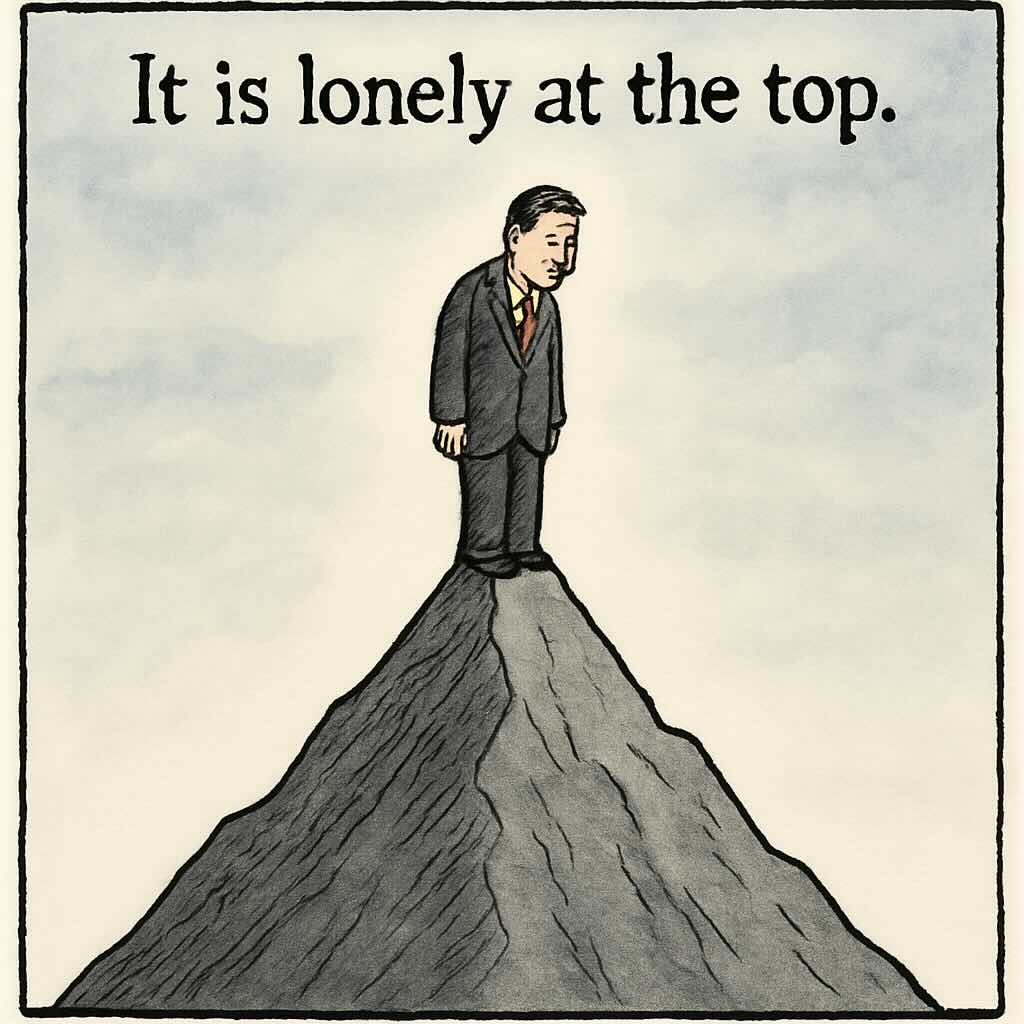I Carry All the Weight in My Relationships but No One Cares for Me
If you’re high-performing but lonely, there’s a good chance you’ve been rewarded for your roles and forgotten for your real self.

I believed a lie for years:
If I’m not the flawless partner, I’m unlovable.
If I’m not the star employee, I’m replaceable.
High achievers are often praised for being endlessly capable. But here’s the trap: constant performing trains everyone around you to relate to your roles, not to you. The more “together” you seem, the fewer people ask how you’re really doing.
A researcher friend, who juggles grants, lab teams, and parenting, whispered after a meeting:
That’s the quiet ache of relationship loneliness. You can be loved, partnered, even admired—and still feel invisible.
Loneliness in a relationship: signs and causes
Feeling lonely in a relationship doesn’t always mean something is “wrong” with the relationship. Often, it’s about the distance between who you are and who you feel you need to be.
Common signs of relationship loneliness
- You feel like a “support system,” not a person.
- Conversations stay logistical (meals, schedules, tasks) and avoid feelings.
- You perform attentiveness instead of admitting you’re tired or overwhelmed.
- Quality time happens, but you still feel unknown afterward.
Why it happens
- Role overload: You’re always “on”: leader at work, nurturer at home, attentive partner on date night.
- Perfection pressure: Fear that imperfect = unlovable keeps you masked.
- Emotional autopilot: You help everyone else process, but no one witnesses you.
- Thin social web: No platonic friends to share the load, so your partner becomes the only outlet.
Loneliness in marriage: why it happens (even when you love each other)
Marital loneliness can creep in quietly. Life gets efficient. You become excellent teammates and co-parents,but intimacy thrives on honesty, not just coordination.
- Silence replaces curiosity: You stop asking real questions because you “already know.”
- Duty replaces depth: You move from ritual to ritual and miss the messy, human moments.
- Unshared inner world: Feelings get edited to keep the peace, and the bond thins.
The paradox: the better you perform, the lonelier you become because people see your roles, not you.
Where performance kills intimacy
Real connection lives in the unscripted moments:
- The ugly-cry over burnt toast.
- The shared silence that doesn’t need rescuing.
- The “I don’t know either” confession.
When you’re always “on,” you trade depth for duty. You hold everyone else together, but who holds your chaos?
The art of dropping the act
Freedom begins when you build spaces with no audience: places where you can put the backpack of roles down.
A friend started “untethered hours”:
Thursday nights drawing badly.
Texts to friends that say,
“Vent session? No advice needed.”
Within weeks, her husband said:
How to recharge your human battery (not your résumé)
- Designate a role‑free zone: A porch, park bench, or corner of a room where nothing is expected of you. Start with 10 minutes.
- Practice imperfect presence: At dinner, try “I’m tired and a little checked out” instead of powering through. Notice how others lean in.
- Seek witnesses, not fans: Find one person who cherishes your unmasked self. Even a therapist or a journal counts.
- Break the script: Answer “How are you?” honestly once today. “Overwhelmed, actually. You?”
How to make platonic friends as an adult (and keep them)
A strong circle of platonic friends reduces pressure on your partner to be “everything” and gives you more places to be fully seen.
Practical steps
- Lead with specifics: Instead of “We should hang,” try “Coffee Tuesday 7:45–8:30?” Specifics create momentum.
- Micro‑invites: 20–40 minute walks, co‑working hours, library runs. Low‑stakes beats “let’s plan a big thing.”
- Be first to go real: Share a 15‑second honest check‑in. Authenticity invites authenticity.
- Create recurring touchpoints: Monthly board game night, Saturday trail loop, “new recipe” club.
- Use tools that reward realness: Choose communities and apps designed for interest‑based, platonic connection over endless swiping or likes.
Simple daily practices to feel seen and connected
- 3–2–1 unmask: Share 3 facts, 2 feelings, 1 ask with someone you trust this week.
- Signal the mode: Text “Vent/no fix?” or “Brainstorm?” so friends know how to show up.
- Normalize lows: Add “energy level 4/10” to your check‑ins to keep it human.
- Protect solitude: 10 device‑free minutes daily. If you can’t be with you, others can’t, either.
 Build authentic friendships with Bubblic
Build authentic friendships with Bubblic
Match by shared interests and values without profile photos, send low-stakes voice messages, and foster deep connections with people around the world.
Get the appThe truth under the armor
You weren’t built to be a perpetual performance machine. You were built to be seen.
The right people won’t love you for your roles. They’ll love the exhausted, messy, gloriously unpolished human who forgets to water plants and laughs at cat videos.
Stop pouring from an empty cup. Let someone help refill it.
FAQ: Relationship loneliness and platonic friendship
Why do I feel lonely in a relationship even when we live together?
Proximity isn’t the same as intimacy. If you’re constantly performing a role (cheerleader, fixer, planner), there’s little room for your unedited self. Small moments of honest sharing (“I’m anxious today and not sure why”) rebuild felt closeness.
Is loneliness in marriage normal?
It’s common during stressful seasons, new parenting, career shifts, or caregiving. It becomes a problem when the distance feels chronic and unspoken. Naming it kindly (“I miss us”) opens the door to repair.
What is a platonic friend?
A platonic friend is a non‑romantic, non‑sexual relationship built on trust, care, and shared experiences. Strong platonic friendships lower pressure on romantic partnerships and increase overall life satisfaction.
How do I make platonic friends as an adult?
Lead with consistency over intensity. Use short, specific invites; repeat pleasant activities; and be the first to share something real. Tools like YourApp can help you meet people by interests and set up low‑pressure hangouts.
How can I talk to my partner about loneliness without hurting them?
Use “with” language, not “at” language. Try: “I notice I’ve been performing instead of sharing. I want us to feel closer. Can we set aside 20 minutes tonight to check in?” Focus on the future you want to build together.
When should I seek professional help for relationship loneliness?
If loneliness feels persistent for months, affects sleep or
appetite, or you’re stuck in repetitive conflict or withdrawal,
a therapist or couples counselor can help you rebuild safety and
connection.
This article offers general information and stories, not medical
or mental health advice. If you feel persistently lonely,
anxious, or depressed, consider speaking with a licensed
professional. If you’re in crisis or thinking about self-harm,
seek immediate help in your region.